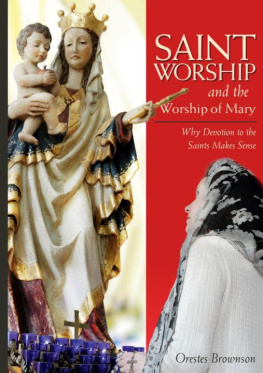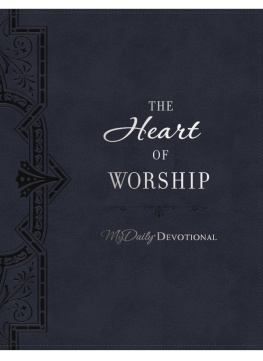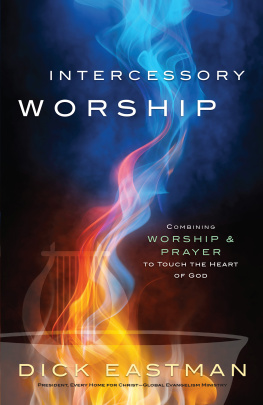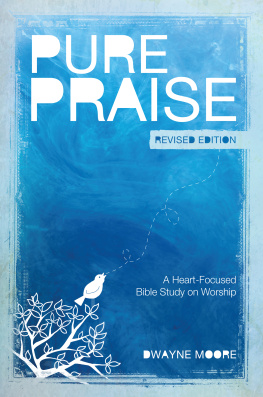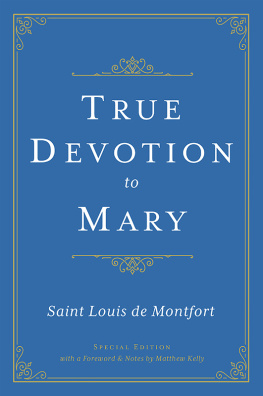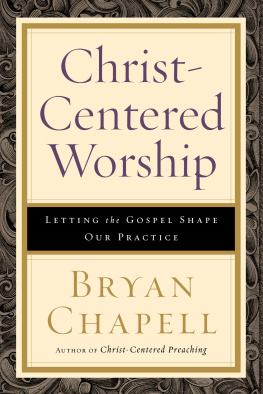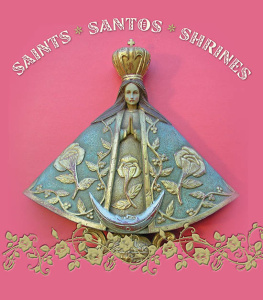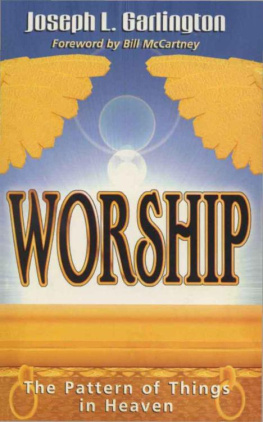Orestes A. Brownson
Why Devotion to the Saints Makes Sense
SOPHIA INSTITUTE PRESS
Manchester, New Hampshire
Saint Worship and the Worship of Mary was originally published in 1963 by St. Anthony Guild Press, Paterson, New Jersey. This 2003 edition by Sophia Institute Press includes editorial revisions, and Part II has been abridged and divided into individual chapters.

No part of this book may be reproduced, stored in a retrieval system, or transmitted in any form, or by any means, electronic, mechanical, photocopying, or otherwise, without the prior written permission of the publisher, except by a reviewer, who may quote brief passages in a review.


...................... ix
Part I: Saint Worship
................ 5
.. 35
.. 43
. 51
.. 57
....... 71
..... 87
............ 91
....... 97
..... 103
.. 111
....... 119
........ 127
Part II: The Worship of Mary
........ 135
.............. 143
.... 151
.. 171
In 1865, when the Very Reverend Edward Sorin, founder of Notre Dame University, and later Superior General of his congregation, established the Ave Maria, he appealed to Orestes Brownson to enrich its pages with some of the gems of thought and composition for which the distinguished Catholic philosopher was known.
In response, Brownson began a series of articles on the veneration that Catholics pay to the saints, particularly to the Mother of God. After Brownson's death, years later, his son Henry collected the articles and incorporated them into Volume VIII of his father's Works. But as Brownson's Works are now extremely difficult to come by, it has been thought that it would be a genuine service to reprint these articles for the public at large in a popular form. The closely related separate article entitled "The Worship of Mary," written in 1853 and also found in Volume VIII of Brownson's collected Works, is included here with the Ave Maria series.
In treating this subject, Brownson seldom or never gave way to emotionalism or sentimentality, but wrote rather as the philosopher who wished to show that the honor or veneration that Catholics pay to the saints is warranted, and indeed called for, on the grounds of the strictest theological reasoning. He had in mind that he was writing mainly for Catholics living in a country where Catholic practices were widely regarded as superstitious and were often under attack. In this matter, as in all his other writings as a Catholic apologist, he wrote with the twofold design, of strengthening the faith of his fellow Catholics and of demonstrating its intrinsic rightness to their adversaries. It would be difficult to find anywhere a tract that defends Catholicity more thoroughly and forcefully against the imputation of idolatry or superstition, in the honor it pays the Mother of God and the saints, than the treatises presented here.
In his effort to present his line of thought on this subject with all possible clearness, when first publishing it serially, Brownson sometimes repeated, in one form or another, ideas he had developed in a previous issue. This tended to bridge the installments and thus to aid the general continuity of thought. It has been deemed advisable not to retain these recapitulations in presenting his thought as a single whole. Their original purpose no longer holds, and their elimination gives to the general text an easier flow for the present reader. On the same principle, some passages have been dropped from the essay "The Worship of Mary" that are virtually identical with those appearing in "Saint Worship." Finally, a very few minor alterations have also been made to accord with the changing genius of the English language. All has been done only in the interest of presenting Brownson's message in its intrinsic force and eloquence in the hope that it will reach the wide readership it so richly deserves.








All love is demonstrative. It seeks always to express itself, and the expression of love is worship. From love springs alike the worship of God and of all that is godlike or related to the supreme and central object of love.
In every age of the Church, saint worship has never come about by virtue of any positive precept, but from the overflowing of the pious Catholic heart. It is, if I may so speak, a necessity of Catholic piety. The love with which the regenerate and faithful soul is filled cannot be satisfied without it. That love must worship, and it must worship the universal God: God in Himself and God in His works, all of which, through His creative act, partake of His divine being and are, through the medium of the act, identified with Him. The worship would seem to the soul incomplete, defective, if it did not embrace the creature with the Creator, and especially if it did not include the saints, who, of all His creatures, are the nearest and dearest to Him. The heart that does not include them in its love of God, and honor them in its honor of Him, may break no positive command, but it may be assured that it has at best only a stingy love and has no reason to applaud itself for either its logic or the fullness of its devotion.
Protestant sects regard the worship we render to the saints, especially to the Blessed Mother of our Redeemer, as idolatry. But this is because they do not consider that to worship God in His creatures, especially His saints, redeemed by His blood and sanctified by His grace, is still to worship God; or that the worship we render to the saints is never that which we offer to God Himself. Supreme worship is due to God alone, and to give it to another is idolatry, is treason to the Most High, to the Majesty of Heaven and earth. None know this better than Catholics.
But worship is a general term, which includes not only different degrees, but different species. The word is from the Anglo-Saxon weorthscipe, which means simply the state or condition of being worthy of honor, respect, or dignity. And to worship is to ascribe worth, honor, dignity, or excellence to someone literally, to honor someone - it may be God, the magistrate, or simply any man - for his office, station, acquirements, or virtues. The word itself may with like propriety designate the religious homage we owe to God, the reverence we give to the saints, or the civil respect we pay to persons in authority, whether in Church or state. Idolatry is not in rendering worship to men, but in rendering to them the worship that is due to God alone.

